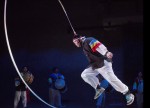The vibratos of the strings sang the melancholy tune of “Arirang,” a Korean folksong that mourns a long-gone companion.
More than 1,800 people filled Royce Hall Thursday night for this year’s Korean Culture Night, which opened the show with the words “People of North Korea live, laugh and struggle, just like me and you.”
The show discussed the conditions in North Korea, which lead some citizens to abandon their homeland. The performances also focused on unearthing the similarities between North Korea and South Korea – the two nations split in 1945.
Thousands of North Koreans seek refuge by crossing their nation’s borders to neighboring countries every year, risking their lives through the possibility of being killed by the socialist government.
Hanoolim Korean Cultural Awareness Group, a student group that aims to spread Korean culture, put on the 22nd annual Korean Culture Night. The full-house event opened up with a two-hour long theater production, accompanied by traditional performances and hip-pop and b-boy dances, under the unifying theme “a journey across the DMZ.”
Inspired by the actual stories of North Korean refugees, this year’s production, “Arirang,” was about a North Korean boy who struggles with his family and within himself as he takes a journey across the border to China, leaving his family behind.
Korean Culture Night used to be centered around music and dance performances for entertainment, but theater productions took over as the main event in the past eight years to focus more on the living culture of Koreans, said Sarah Kim, the executive producer of Korean Culture Night and a fourth-year psychobiology student.
Last year’s production, “The Tale of Two Lilies,” depicted the lives and struggles of Koreans who lived through the International Monetary Fund crisis that hit South Korea in 1997 and the Japanese occupation that ended with the nation’s division in 1945.
Esther Park, the senior advisor of the student group Liberty in North Korea at UCLA and a fourth-year Asian American studies student, said that “Arirang” is unique because it portrays a normal North Korean family as the same as any other family.
She said that Liberty in North Korea at UCLA collaborated with Hanoolim to ensure that all information on North Korea presented during the performance to the audience was accurate.
This year’s cast comes from a variety of backgrounds, including Eunice Lim, a first-year molecular, cell and developmental biology student, who never had any previous acting experience and tried out for the audition on a whim.
Even though she said she was not expecting to get a major role, Lim joined the crew to act as the protagonist’s sister, “Minji Kang,” who embodies a message of hope despite suffering from typhoid fever.
Throughout the play, students integrated traditional and modern performances that uplifted the energy in the auditorium during transitions between scenes.
B-boys wore fierce masks and acted out the strength and aggressiveness of North Korean authorities through breakdancing.
Poongmul, a traditional performance that promotes optimism during the harvest seasons, delivered the same cheerful atmosphere during the show through the beating of the Korean drums along with rhythmic dancing and chant shouting.
As the executive producer, Kim noted that she hopes that the audience walked out with a more open mind toward people living in different parts of the world.
“We (were not) trying to portray any political stance, but (tried) to show that these North Koreans are like ourselves,” she said.
